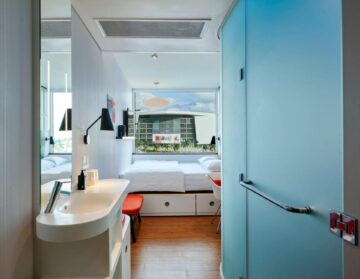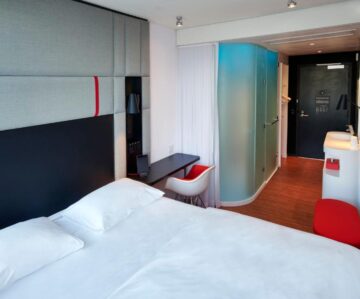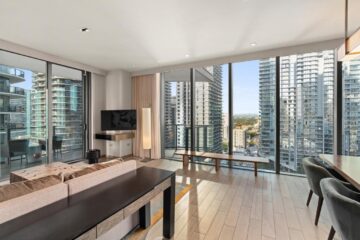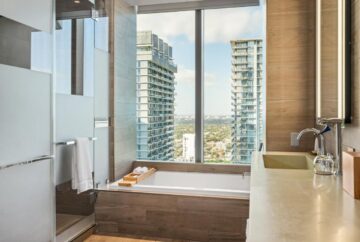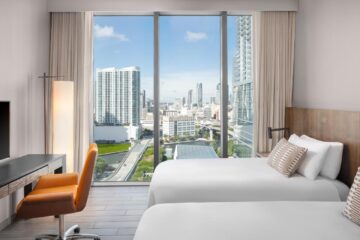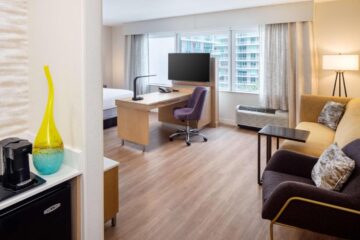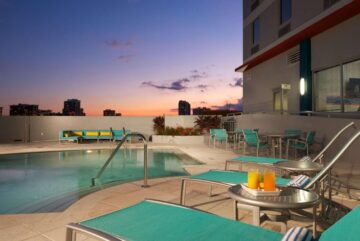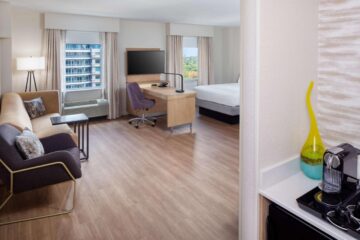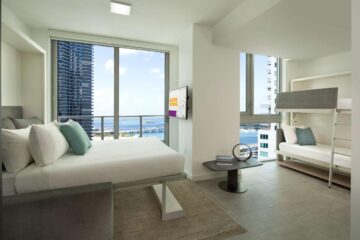Miami is a growing hub for digital nomads, offering a mix of sunny weather, vibrant culture, and fast internet. The city has a variety of co-working spaces, especially in neighborhoods like Wynwood and Downtown, which also feature plenty of work-friendly cafes. Miami’s diverse expat community and frequent networking events make it ideal for remote workers. Public transportation is improving, but most people rely on cars or ridesharing services. While the cost of living can be high, Miami’s beaches, dynamic lifestyle, and tax-friendly environment are major draws for nomads.
Nomad Score: 7/10 ・ Cost of living: $4700/month ・ Internet speed: 190 Mbps
▶ The Elser Hotel Miami – Bay View Studio Suite with King Bed
▶ citizenM Miami Worldcenter – King Room
▶ EAST Miami – Urban King Room
▶ Hampton Inn & Suites by Hilton Miami Downtown/Brickell – King Room
▶ YOTELPAD Miami – Studio PAD Double Queen
This guide should help you make the most of your time in Miami as a digital nomad, balancing work with the city’s sunny lifestyle and vibrant culture:
1. Internet and Connectivity
- Wi-Fi: Miami offers fast internet in most locations, with many cafes and co-working spaces providing reliable Wi-Fi. There are also plenty of public areas, including parks and beaches, with access to free Wi-Fi.
- Mobile Plans: Local providers like AT&T, T-Mobile, and Verizon offer competitive prepaid and postpaid mobile plans with 4G/5G coverage, ensuring you stay connected wherever you are.
2. Co-working Spaces
Miami has a growing digital nomad scene with plenty of co-working spaces:
- WeWork Miami: Multiple locations across the city, offering professional environments and networking opportunities.
- The LAB Miami: Located in Wynwood, it’s a popular co-working space for creatives and entrepreneurs.
- StartHub: Found in Downtown Miami, providing a dynamic atmosphere for startups and freelancers.
- Büro: With locations in Midtown, Coconut Grove, and South Beach, it offers stylish co-working spaces with flexible memberships.
3. Cost of Living
- Accommodation: Miami can be pricey, especially in areas like South Beach and Brickell. A one-bedroom apartment can range from $2,000 to $3,500 per month. More affordable options are available in neighborhoods like Little Havana or North Miami.
- Food: Miami’s diverse food scene offers options from affordable street food to high-end dining. You can find budget meals for $10–$20, or explore the numerous food trucks and Latin American eateries in neighborhoods like Little Havana and Wynwood.
- Co-working: Monthly memberships for co-working spaces range from $200 to $500, depending on the location and amenities.
4. Where to Stay
- Wynwood: Known for its street art and creative vibe, Wynwood is a popular neighborhood for digital nomads with plenty of cafes, galleries, and co-working spaces.
- Brickell: Miami’s financial district, offering high-end apartments, co-working spaces, and proximity to restaurants and nightlife.
- Little Havana: A more affordable option, rich in culture and authentic Cuban cuisine, but still close to central Miami.
- Midtown: A trendy, up-and-coming area, close to both Wynwood and the Design District, offering a mix of residential and workspaces.
5. Transportation
- Public Transport: Miami’s public transportation includes buses, the Metrorail, and the free Metromover in Downtown and Brickell. While the public system is functional, it’s not as comprehensive as in other cities, so most people rely on cars or rideshare services like Uber and Lyft.
- Bikes & Scooters: Miami is becoming more bike-friendly, with bike-sharing services like Citi Bike available throughout the city. Electric scooters are also popular in neighborhoods like Wynwood and South Beach.
- Walking: Some neighborhoods like Wynwood, Brickell, and South Beach are walkable, but other areas may require transportation due to the spread-out nature of the city.
6. Work-Friendly Cafes
- Panther Coffee: Located in Wynwood, a popular spot with strong Wi-Fi and a creative atmosphere.
- All Day: A minimalist cafe in Downtown Miami, offering great coffee, food, and a relaxed workspace.
- Vice City Bean: Another Downtown Miami gem with ample seating and reliable internet.
- Tostada Cafe: A small Cuban-American cafe in Little Havana, perfect for those looking for a local experience while working.
7. Visa and Legal Information
- ESTA: If you’re from a visa-exempt country, you can stay in the US for up to 90 days with an ESTA. For longer stays, consider the B-1/B-2 visa or look into remote worker visas like the O-1 visa for individuals with extraordinary abilities.
8. Networking and Community
Miami’s tech and entrepreneurial scene is growing rapidly:
- Meetups: There are regular tech, startup, and digital nomad meetups in Miami, often centered around Wynwood or Brickell.
- Miami Tech Events: Events like eMerge Americas and Startup Grind Miami offer excellent networking opportunities.
- Facebook Groups: Look for groups like “Miami Digital Nomads” or “Expats in Miami” to connect with fellow remote workers.
9. Local Attractions and Leisure
- Beaches: Miami’s beaches, especially South Beach, are a huge draw for nomads looking for downtime. Lummus Park, Crandon Park, and Key Biscayne offer relaxing escapes.
- Art and Culture: Explore Wynwood Walls for world-famous street art, or head to the Pérez Art Museum Miami (PAMM) for modern and contemporary art.
- Nightlife: Miami is known for its vibrant nightlife, especially in South Beach and Brickell, offering a variety of clubs, bars, and live music venues.
- Parks: Visit Bayfront Park or Maurice A. Ferré Park for waterfront views and outdoor activities.
10. Health and Safety
- Healthcare: The US healthcare system is private, so be sure to have comprehensive health insurance. Miami has world-class hospitals and clinics, but healthcare can be expensive without coverage.
- Safety: Miami is generally safe, though some areas like Overtown or parts of Little Haiti can be less secure, especially at night. Always be mindful of your surroundings, especially in tourist-heavy areas where petty crime can occur.
Bonus Tips
- Weather: Miami is hot and humid year-round, with hurricane season running from June to November. Pack accordingly, and always check the weather forecast during hurricane season.
- Taxes: Florida has no state income tax, making it an attractive option for digital nomads looking to optimize their tax situation.
- Networking: Take advantage of Miami’s growing reputation as a tech hub by attending local events and connecting with the city’s expanding community of remote workers and entrepreneurs.



